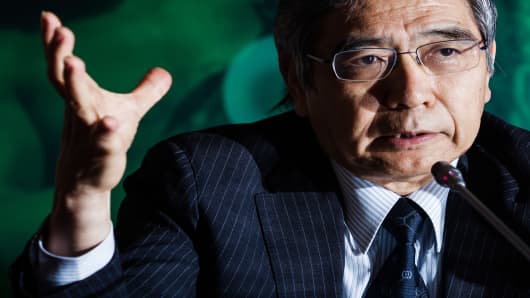Huge purchases of longer-dated Japanese government bonds is a natural way to ease monetary policy, but central bankers must monitor the side-effects, Haruhiko Kuroda, the government's nominee to be the next Bank of Japan governor, said on Monday.
Kuroda said the size and type of assets the BOJ now buys is not enough to achieve its 2 percent inflation target, which he said the central bank would strive to hit within two years.
Prime Minister Shinzo Abe nominated Kuroda, president of the Asian Development Bank and an advocate of aggressive monetary easing, to become the new governor in a push for bolder efforts to end nearly two decades of deflation. His nomination is likely to be approved by parliament.
"If the BOJ were to ease policy, it would therefore be most natural for it to increase government debt purchases and target longer-dated bonds," Kuroda said in a confirmation hearing in the lower house of parliament.
"It would be natural for the BOJ to buy longer-dated government bonds in huge amounts. But the central bank also needs to scrutinise market developments at the time, as well as the potential drawbacks."
(Read More: Kuroda: Huge Purchases of Longer-Dated JGBs Natural )
Japan's former top currency diplomat, Kuroda, 68, would replace incumbent Masaaki Shirakawa, 63, who is due to leave office on March 19 along with his two deputy governors.
Abe has already successfully pushed for changes at the BOJ, which doubled its inflation target to 2 percent in January and agreed to an open-ended asset buying programme from 2014.
"The BOJ must clearly send out the message, through communication with markets, that it will do whatever it can to beat deflation," Kuroda said.
(Read More: 'Abenomics' Picks Up Speed With Kuroda Nomination)
Expectations the new leadership team is expected to push for even more aggressive monetary stimulus have nudged the yen to a near three-year low against the dollar, giving the export-reliant economy some relief.
Last week Abe also nominated academic Kikuo Iwata, who supports unconventional monetary policy, and BOJ official Hiroshi Nakaso, who has hands-on knowledge of the central bank's inner workings, as the BOJ's next two deputy governors.
Officials from some countries, such as Germany and South Korea, have hinted at concerns that if the BOJ increased debt purchases this would weaken the yen and spark a wave of competitive currency devaluations.
(Read More: 'Ugly Move' in Yen a Sign of What's to Come?)
Acknowledging these concerns, Kuroda told lawmakers that while the BOJ is not out to weaken the yen specifically, it can be a side-effect if the central bank steps up its battle against deflation.
"There's evidence that currencies tend to fall for countries that ease monetary policy on a large scale ... But the BOJ's policy is not targeting currencies," Kuroda said.
"The important thing is to ensure price stability and achieve the 2 percent price stability goal, although it could affect currencies in that process."
The nominations must be approved by both houses of parliament to take effect. Abe's ruling camp controls the lower house but lacks a majority in the upper house, so needs the support of opposition parties to pass the nomination.
Opposition parties have signalled they will support the nominations.


